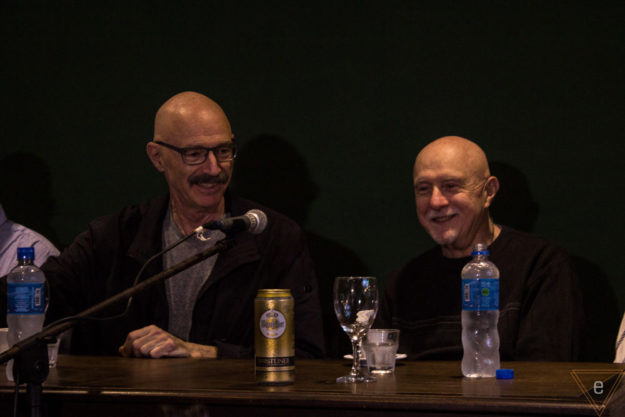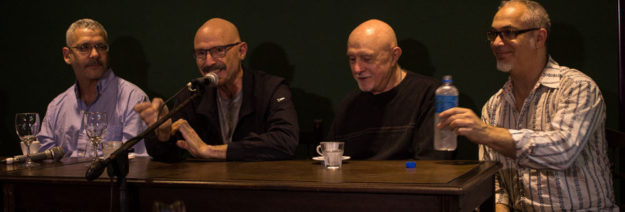Brothers should Stick together
“Los hermanos sean unidos, pues esa es la ley primera“. One of the golden rules from Argentina’s classic epic: José Hernández‘s “Martín Fierro“. The literal translation goes “Brothers be united, because that is the first law”.
The most common english equivalent is “strength in numbers“, but the familiar undertone to it turns it into “brothers should stick together“. But what if one of the brothers is a Stick master?
This wednesday, Tony Levin arrives in Mar del Plata with his band Levin Brothers to pay tribute to the jazz records of the 50’s. Before their show, we chatted with him about this brand new project from which emerges the first material created jointly with his brother Pete. The Levins will be joined by Erik Lawrence on sax and Jeff Siegel on drums.
By Mariano Manfredi & Andres Guazzelli | PH: Vanesa Falcone
Tony Levin is one of the most recognized and respected bass players in the business. He is also a great musical experimenter and his work is renowned by its originality, talent and innovation. He is a staple in Peter Gabriel‘s band and has played with Pink Floyd, John Lennon, Paul Simon, Gary Burton, James Taylor, Goro Noguchi, Judy Collins, Joye Yamanaka, Carly Simon, Peter Frampton, Tim Finn and Richie Sambora, among others.
We were wondering about the fact that Tony and Pete have never jointly led such a project before. There is no doubt they are among the most recognized, respected and experienced musicians out there, therefore, the opportunity to edit an album together was always present. So why now?
– What is so special about this moment in your lives and careers to embark now on a project together?
Actually, the idea for this album, and band, only came to me about 3 years ago. I was practicing the cello, which I sometimes play, though not as much as the bass… and I remembered the cello and bass playing of Oscar Pettiford, my favorite bassist growing up, in the 1950’s. Pete also loved the records of Oscar (and French horn player Julius Watkins) and I asked Pete how he felt about us writing new music in that style and doing an album of it. He loved the idea and it came together very easily. The style, called ‘cool jazz’ has short, melodic tunes, and the solos aren’t long, so the whole track is much shorter than in other styles of jazz, and to me it kind of forces you to do your very best solo playing in a short space, then move over for the next player. We’re really enjoying dong it live too.
– How is the dynamic of a family-band? Is it easier or harder to work with your brother? Specially since you both come from such different musical backgrounds, Pete coming from mainly jazz and Tony being more closely connected to progressive rock. Was there a middle ground?
– Actually it’s very easy for us. We get along very well, both personally and musically. And we’re not so far apart in style… I would describe Pete as a jazz player who plays rock a lot (including, years ago, in my “Tony Levin Band”) and I’m a rock player who plays jazz a lot. In this band, we had a specific jazz style in mind from the start, so the decisions were easy.
I should mention that in the live show, we do plenty of music aside from the new album’s pieces. Even our version of a Peter Gabriel song (“Don’t Give Up”) and King Crimson one (“Matte Kudasai”) as well as Astor Piazzolla‘s “Milonga del Angel”.
– There’s been a “vinyl revival” of sorts the last few years, and you decided to release, along with the CD, a vinyl version of your album. Does vinyl have any special meaning to you? Was it because of the format’s intimate connection with jazz or was it something else?
– Well, this recording was somewhat a tribute to the 1950’s jazz recordings, so of course it was my wish to have a vinyl version, not only for the music but the size of the cover makes the graphic artist in my very happy. And, as in the old days, ‘liner notes’ on the back, explaining something about the music. We decided to even wear suits and ties in the studio making the record, as they did back then. Usually the finances of releasing a vinyl version in addition to digital, keeps you from doing it. But this time, the recording being something of a ‘bucket list’ thing for me, I decided to make sure it could come out as an LP too. And a nice surprise, with the shorter length tracks, and more of them, it was easy to fit more music onto the LP than you usually can with long tracks.
– How much of your composing and arranging derives from live improvisation and how much from a conscious plan to sit down and compose a new track?
– Depends on the band. In Stick Men, some of our improvising leads to compositions, but there’s also plenty of individual composing. With Levin Brothers, I started pieces off, but then sent them off to Pete to finish the chord structure, knowing he’d do it the way I intended. And, as I’ve said, musical ideas are always coming to me, and I try to keep them handy, even if the chance to use them might not come for years.

– Regarding the Chapman Stick, from a composing and arranging perspective, and coming from an electric bass and double bass background, how was your approach to an instrument so radically different yet so intrinsically similar? Specially since you seem to think, feel and arrange the Stick as from a bass standpoint, while other stick players do it more from a guitarist or a keyboardist point of view.
– The Chapman Stick is a wonderful instrument, not only to play, but to write on, it’s so different than a bass or guitar, and different things are possible. Having said that, a lot of the music I write is just in my head, and I literally write it down (sometimes pulling over on the side of the road if I’m driving) and only later decide what band to use it in, and what instruments it wants to have on it. That was not the case with the Levin Brothers pieces, but it often the case with other writing I do.
By the end of our interview, we talked about a whole century passing since the Jazz Age in America and asked Mr. Levin how does he see the current jazz scene worldwide and the course he believes it is taking. He was more than clear:
“I wish I knew – in fact, I’m not good at predicting the direction of music of any style… I’m just a player who loves having the chance to make good music.“.
If we talk strictly about chance, chances are we won’t get another world-class show such at this in a long, long time, so don’t miss this one out. The night promises excellence.







No Response
Leave us a comment
No comment posted yet.